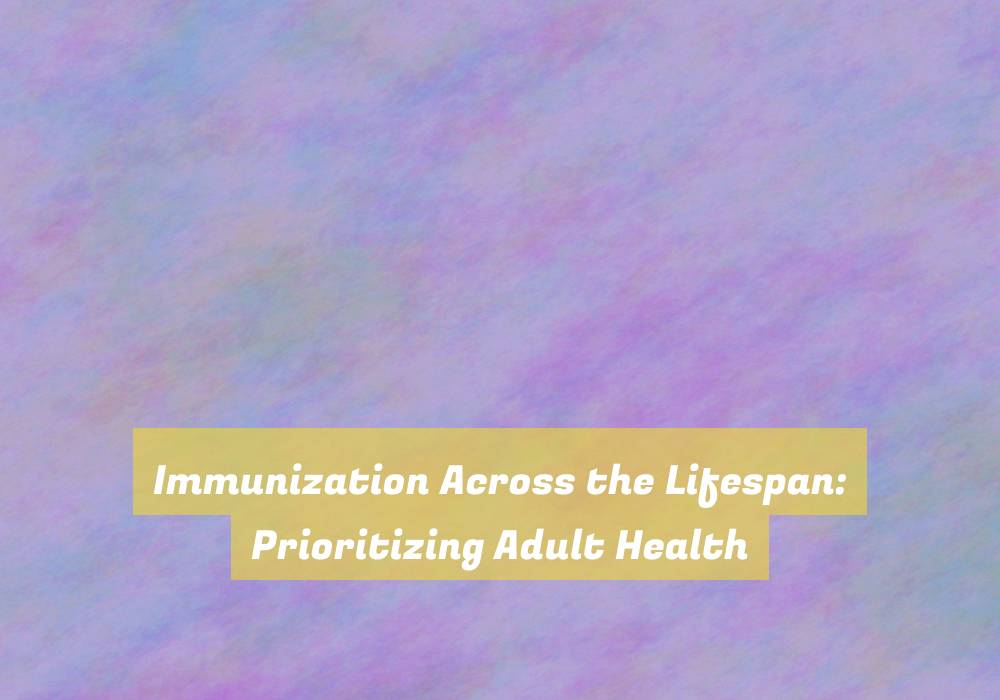Immunization Across the Lifespan: Prioritizing Adult Health
You might have heard a lot about childhood vaccinations, but have you ever thought about the importance of immunization across the lifespan, especially when it comes to prioritizing adult health?
As you navigate through the complexities of life, itG??s easy to overlook the significance of staying up-to-date with vaccines beyond childhood. However, the impact of adult immunization goes far beyond individual health G?? it extends to the well-being of communities and public health as a whole.
So, how can prioritizing adult health through vaccination shape the future of healthcare? LetG??s explore the role of adult immunization and the recommended strategies for promoting it.
Importance of Adult Immunization
Adult immunization is crucial for maintaining overall health and preventing the spread of infectious diseases. As an adult, you may think that vaccinations are only for children, but staying up to date on your immunizations is just as important for you. By getting vaccinated, you not only protect yourself from potentially serious illnesses but also help prevent the spread of these diseases to others in your community.
Vaccines are especially vital for adults with chronic health conditions, such as diabetes or heart disease, as theyG??re at higher risk of complications from certain infections. For example, the flu vaccine is recommended for all adults, but itG??s particularly crucial for those with underlying health issues. Additionally, certain vaccines, like the Tdap vaccine, protect against diseases like tetanus that can be acquired through everyday activities.
Moreover, as an adult, you play a key role in safeguarding vulnerable populations, such as young children and the elderly, by minimizing the risk of transmitting infectious diseases to them. By staying immunized, you contribute to the collective effort of creating a healthier and safer community for everyone.
Recommended Vaccines for Adulthood
To maintain optimal health and protect against infectious diseases, itG??s important for you to stay up to date on recommended vaccines for adulthood. Vaccines arenG??t just for children; theyG??re also crucial for adults in preventing serious illnesses.
The Centers for Disease Control and Prevention (CDC) recommends several vaccines for adults, including the influenza vaccine, which should be received annually to protect against the flu.
Additionally, the Tdap vaccine, which protects against tetanus, diphtheria, and pertussis, is recommended for adults who havenG??t previously received it. The shingles vaccine is recommended for adults over the age of 50 to prevent shingles, a painful rash that can have long-term effects.
Adults should also consider the pneumococcal vaccine, especially if theyG??ve certain chronic health conditions. ItG??s important to discuss with your healthcare provider which vaccines are recommended based on your age, health status, and any potential exposure risks.
Staying updated on these recommended vaccines can significantly contribute to your overall health and well-being.
Impact of Prioritizing Adult Health
Prioritizing adult health can lead to a stronger and more resilient immune system, reducing the risk of serious illnesses and improving overall well-being. By focusing on adult immunization, you can effectively prevent debilitating diseases such as influenza, pneumonia, and shingles. This not only safeguards your health but also minimizes the burden on healthcare systems.
Prioritizing adult health also promotes a healthier community by reducing the spread of infectious diseases. It allows you to continue leading an active and productive life without being hindered by preventable illnesses.
Moreover, prioritizing adult health through immunization can have significant economic benefits. By preventing diseases, you can potentially avoid costly medical treatments and lost productivity due to illness. This not only benefits individuals but also contributes to a more robust and thriving economy.
Additionally, with a stronger immune system, adults are better equipped to care for their families and contribute to their communities.
Strategies for Promoting Adult Vaccination
Considering the importance of adult immunization, itG??s vital to implement effective strategies for promoting vaccination among this demographic. As an adult, itG??s crucial to stay up to date with vaccinations to protect yourself and those around you from potentially serious diseases. One key strategy for promoting adult vaccination is increasing awareness through education. This involves providing clear information about the benefits of vaccination, addressing common misconceptions, and emphasizing the importance of staying immunized throughout adulthood.
Another effective strategy is integrating vaccination into routine healthcare visits. By making vaccines easily accessible during regular check-ups, healthcare providers can ensure that adults are receiving the necessary immunizations based on their age, health status, and risk factors. Additionally, leveraging technology can help promote adult vaccination by sending reminders for upcoming or overdue vaccines, providing access to educational materials, and facilitating appointment scheduling.
Moreover, offering workplace vaccination programs can significantly increase adult immunization rates. Many adults spend a significant amount of their time at work, making the workplace an opportune setting for providing vaccinations. By collaborating with employers to offer on-site vaccinations or educational sessions, healthcare providers can reach a large number of adults who may not seek vaccinations otherwise.
Ultimately, employing a combination of these strategies can help increase adult vaccination rates and contribute to better overall health and well-being.
Conclusion
In conclusion, prioritizing adult health through immunization is crucial for preventing the spread of diseases and promoting overall well-being.
By ensuring that adults receive recommended vaccines, we can protect not only individuals but also communities from outbreaks and potential health complications.
ItG??s important to promote and support adult vaccination efforts to create a healthier and safer environment for everyone.





Your exploration of adult immunization really resonates with me; it’s an aspect of health that often feels overshadowed by the focus on childhood vaccines. As someone who has navigated various phases of adulthood, I’ve seen firsthand how easy it is to neglect our health needs as we get caught up in work, family, and countless other responsibilities. I remember the first time I learned about the importance of the shingles vaccine; it struck me that I had unintentionally dismissed the idea of immunizations as something solely meant for children. The thought that these vaccines play a vital role in safeguarding not just personal health but also community well-being is a powerful motivator.